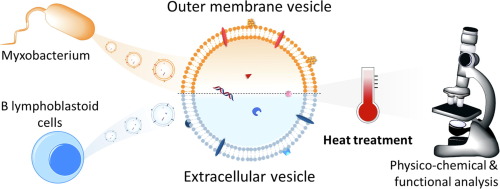当前位置:
X-MOL 学术
›
Eur. J. Pharm. Biopharm.
›
论文详情
Our official English website, www.x-mol.net, welcomes your feedback! (Note: you will need to create a separate account there.)
Hot EVs - How temperature affects extracellular vesicles.
European Journal of Pharmaceutics and Biopharmaceutics ( IF 4.9 ) Pub Date : 2019-12-02 , DOI: 10.1016/j.ejpb.2019.11.010 Eilien Schulz 1 , Anna Karagianni 2 , Marcus Koch 3 , Gregor Fuhrmann 1
European Journal of Pharmaceutics and Biopharmaceutics ( IF 4.9 ) Pub Date : 2019-12-02 , DOI: 10.1016/j.ejpb.2019.11.010 Eilien Schulz 1 , Anna Karagianni 2 , Marcus Koch 3 , Gregor Fuhrmann 1
Affiliation

|
In recent years, extracellular vesicles (EVs) and outer membrane vesicles (OMVs) have become an extensive and diverse field of research. They hold potential as diagnostic markers, therapeutics and for fundamental biological understanding. Despite ongoing studies, numerous information regarding function, content and stability of EVs remains unclear. If EVs and OMVs ought to be used as therapeutics and in clinical environments, their stability is one of the most important factors to be considered. Especially for formulation development, EVs and OMVs need to be stable at higher temperatures. To the best of our knowledge, very little work has been published regarding heat stability of neither EVs nor OMVs. In the present study, we investigated B lymphoblastoid cell-derived EVs and OMVs derived from myxobacterial species Sorangiineae as model vesicles. We exposed the vesicles to 37 °C, 50 °C, 70 °C and 100 °C for 1 h, 6 h and 24 h, and also autoclaved them. Interestingly, physico-chemical analyses such as size, particle concentration and protein concentration showed minor alterations, particularly at 37 °C. Flow cytometry analysis emphasised these results suggesting that after heat impact, EVs and OMVs were still able to be taken up by macrophage-like dTHP-1 cells. These data indicate that both mammalian and bacterial vesicles show intrinsic stability at physiological temperature. Our findings are important to consider for vesicle formulation and for advanced bioengineering approaches.
中文翻译:

热电动汽车-温度如何影响细胞外囊泡。
近年来,细胞外囊泡(EVs)和外膜囊泡(OMVs)已成为一个广泛而多样的研究领域。它们具有作为诊断标志物,治疗剂和基本生物学理解的潜力。尽管正在进行研究,但是关于电动汽车的功能,内容和稳定性的众多信息仍不清楚。如果应将电动汽车和OMV用作治疗剂并在临床环境中使用,则其稳定性是要考虑的最重要因素之一。尤其是对于配方开发,EV和OMV需要在较高温度下保持稳定。据我们所知,关于电动汽车和OMV的热稳定性的研究很少。在本研究中,我们调查了B淋巴母细胞来源的EV和OMVs作为模型囊泡衍生自粘细菌物种Sorangiineae。我们将囊泡分别暴露于37°C,50°C,70°C和100°C 1小时,6小时和24小时,并对其进行高压灭菌。有趣的是,物理化学分析(例如大小,颗粒浓度和蛋白质浓度)显示出较小的变化,尤其是在37°C时。流式细胞仪分析强调了这些结果,表明在热影响后,EV和OMV仍能被巨噬细胞样dTHP-1细胞吸收。这些数据表明,哺乳动物和细菌的囊泡在生理温度下均显示出内在的稳定性。我们的发现对于考虑囊泡制剂和先进的生物工程方法很重要。颗粒浓度和蛋白质浓度显示出较小的变化,尤其是在37°C时。流式细胞仪分析强调了这些结果,表明在热影响后,EV和OMV仍能被巨噬细胞样dTHP-1细胞吸收。这些数据表明,哺乳动物和细菌的囊泡在生理温度下均显示出内在的稳定性。我们的发现对于考虑囊泡制剂和先进的生物工程方法很重要。颗粒浓度和蛋白质浓度显示出较小的变化,尤其是在37°C时。流式细胞仪分析强调了这些结果,表明在热影响后,EV和OMV仍能被巨噬细胞样dTHP-1细胞吸收。这些数据表明,哺乳动物和细菌的囊泡在生理温度下均显示出内在的稳定性。我们的发现对于考虑囊泡制剂和先进的生物工程方法很重要。
更新日期:2019-12-02
中文翻译:

热电动汽车-温度如何影响细胞外囊泡。
近年来,细胞外囊泡(EVs)和外膜囊泡(OMVs)已成为一个广泛而多样的研究领域。它们具有作为诊断标志物,治疗剂和基本生物学理解的潜力。尽管正在进行研究,但是关于电动汽车的功能,内容和稳定性的众多信息仍不清楚。如果应将电动汽车和OMV用作治疗剂并在临床环境中使用,则其稳定性是要考虑的最重要因素之一。尤其是对于配方开发,EV和OMV需要在较高温度下保持稳定。据我们所知,关于电动汽车和OMV的热稳定性的研究很少。在本研究中,我们调查了B淋巴母细胞来源的EV和OMVs作为模型囊泡衍生自粘细菌物种Sorangiineae。我们将囊泡分别暴露于37°C,50°C,70°C和100°C 1小时,6小时和24小时,并对其进行高压灭菌。有趣的是,物理化学分析(例如大小,颗粒浓度和蛋白质浓度)显示出较小的变化,尤其是在37°C时。流式细胞仪分析强调了这些结果,表明在热影响后,EV和OMV仍能被巨噬细胞样dTHP-1细胞吸收。这些数据表明,哺乳动物和细菌的囊泡在生理温度下均显示出内在的稳定性。我们的发现对于考虑囊泡制剂和先进的生物工程方法很重要。颗粒浓度和蛋白质浓度显示出较小的变化,尤其是在37°C时。流式细胞仪分析强调了这些结果,表明在热影响后,EV和OMV仍能被巨噬细胞样dTHP-1细胞吸收。这些数据表明,哺乳动物和细菌的囊泡在生理温度下均显示出内在的稳定性。我们的发现对于考虑囊泡制剂和先进的生物工程方法很重要。颗粒浓度和蛋白质浓度显示出较小的变化,尤其是在37°C时。流式细胞仪分析强调了这些结果,表明在热影响后,EV和OMV仍能被巨噬细胞样dTHP-1细胞吸收。这些数据表明,哺乳动物和细菌的囊泡在生理温度下均显示出内在的稳定性。我们的发现对于考虑囊泡制剂和先进的生物工程方法很重要。


























 京公网安备 11010802027423号
京公网安备 11010802027423号